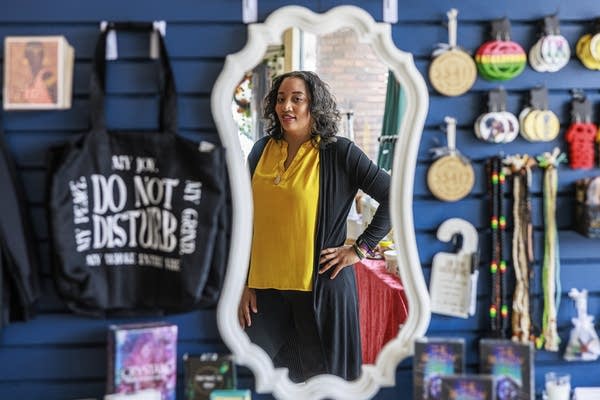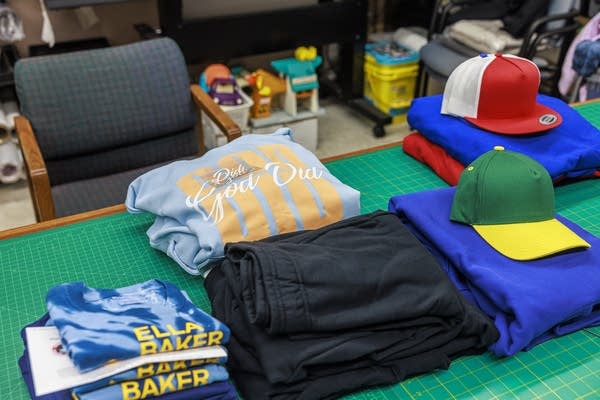Black entrepreneurs say Minneapolis 'Wildest Dreams Expo' was bad for business

Go Deeper.
Create an account or log in to save stories.
Like this?
Thanks for liking this story! We have added it to a list of your favorite stories.
Kanisha Bliss sits behind a table decked out with necklaces and earrings at a pop-up sale at Royal Foundry Craft Spirits in north Minneapolis.
Her business, Beautiful Blessed Bling, was one of the sellers recruited to Minneapolis’ “I Am My Ancestors’ Wildest Dreams Expo” during Black History Month in February. But Bliss said very few people attended the event, even though she and other vendors had been told by organizers to expect a turnout of about 20,000.
Dozens of business owners said the expo organized by the city of Minneapolis to celebrate and uplift Black entrepreneurship actually hurt them. They said the event cost them money they couldn’t afford to lose and according to city records, tens of thousands of dollars in contracts flowed to businesses based outside of Minnesota.
In total, Bliss said selling at the city event cost her about $600.
Turn Up Your Support
MPR News helps you turn down the noise and build shared understanding. Turn up your support for this public resource and keep trusted journalism accessible to all.
“I think they should reimburse us for what we lost. In my case, I’m a single parent, and I have a child with special needs, so I’m trying to make a living off my small business,” she said. “I don’t have money to spend like that.”
She’s not alone. Dozens of vendors, mostly Black small business owners, found themselves in the same situation, according to Markella Smith, owner of the Dream Shop in north Minneapolis, who also was a vendor at the expo.

There was no fee to be a vendor. But Smith and others had to set aside time, prepare products and pay for things like parking and food at the convention center during the daylong event.
After loading her tables and chairs into the space the night before the expo, Smith said she knew something was wrong. The next day, the big space at the convention center was empty. She said vendors paid a price for the city’s failure to adequately promote the expo.
“A lot of what I heard was that this was disappointing, and that they’re left carrying extra product or they’re left with just a loss in general,” Smith said. “How do we fill that void?”
Smith was among the small business owners who organized the pop-up last weekend to try to help Black entrepreneurs hurt by the expo’s failures. More than $500,000 taxpayer dollars went into the expo.

The Atlanta-based and Black-owned Touched Apparel was contracted to organize the event. The initial contract between the city and Touched Apparel was for $175,000, including a salary for one employee of $75,000 or $3,125 a week. The total amount was later increased to $242,000, according to documents released after a records request.
A former Atlanta City Council candidate was awarded $7,000 to serve as a panelist, a media group got another $7,000 and another group was awarded $6,500 for “creative design.” A New York state-based company had a contract for $32,000 for video work at the event.
A spokesperson for the city of Minneapolis said no one from the city made any promises to vendors about revenue or event attendance. There were just three responses to the request for proposal to organize the event, and Touched Apparel was chosen by Tyeastia Green, who was the head of the Department of Race, Equity, Inclusion and Belonging. Green resigned last month after coming to the city in 2022 from a similar job in Burlington, Vt.
Smith said she never personally spoke to Green who was charged with organizing the event, but that communication with Touched Apparel was “spotty” before the event. She wonders why the city couldn’t have found locals who could support the event.
“It’s also on the verge of disrespectful because there are so many businesses that can do this, that can plan something, that can market, that can do all the things, so why weren’t we contacted?” Smith said. “Why couldn’t we have been a part of making it great? We could have.”

KB Brown owns Wolfpack Promotional, which he says is the only Black-owned full-service union print shop in the state. He said he got an incomplete request for a bid from the city in late January, but that he didn’t get any more info until the week before the event. Soon after, he found out that a mentor in St. Paul got the printing contract instead.
Documents received by MPR News show that many requests for proposals were released by the city on Feb. 9 with a due date just nine days later. Selection for many contracts was made on Feb. 20, just five days before the expo.
Brown said this is part of a longstanding problem with how the city does business.
“The only time I get contracts from the city is if I know someone in the office,” Brown said, “Outside of that, winning a contract with the city takes an act of God when you’re a minority.”
The city is expected to audit the expo, which led to the resignation of Tyeastia Green, who was alleged to have misstated funding sources for the event. Green, in turn, has accused the city of creating a hostile environment for Black employees and threatened a lawsuit against a Black council member for defamation.
Brown said he checked out the expo “to be petty,” and because he wanted to give Green “a piece of my mind.” He didn’t find her, but he did express his frustration to Green’s former boss, interim City Operations Officer Heather Johnston.
Brown said the Black business community mostly knows one another, and he realized very quickly after arriving at the event that the people selling at the expo “were pissed.”
Brown doesn’t blame Green, though he takes issue with some of her responses on social media to Black business owners who were upset about the expo’s failure.

“This is not on Tyeastia. This is on the city. And this is on the systemic problem,” Brown said. “Because this is a fight that I’ve been fighting way before Tyeastia came back.”
Seanie Sheppheard is the organizer of the monthly Black Market, which showcases Black, Indigenous and people of color-owned businesses. She contracted with the city to help recruit vendors for the expo.
She is protective of vendors she works with at the Black Market and said it was risky for her to put her hard-earned reputation on the line for the expo, but that she thought the event during Black History Month was important enough that it was worth helping.
The worst lesson city officials could take from the 2023 expo, Sheppheard said, is that the celebration of Black residents shouldn’t happen next year.
“I could definitely see leadership saying, OK, we wasted a lot of money, we hurt the city, and let’s just never do this again. But honestly I think that would be the true misstep,” Sheppheard said. “Ensuring that 2024’s Black History Month celebration is perfect and extraordinary and warm and welcoming for all is where our efforts should be right now.”
Smith of the Dream Shop said she and others in her tight-knit business community think it would only be fair if the city tried to make the expo up to small business owners who were harmed by its failure.
“I still believe that the vendors that are there should be compensated. We’re still asking for a public apology,” Smith said. “We’re still asking for an audit. Because the city didn’t do their due diligence, regardless of all the politics.”
The Minneapolis City Council’s audit committee is expected to discuss audits of the expo at a meeting next week.



